|
"CASTING DOWN GOLDEN CROWNS"
TABLE OF CONTENTS |
|
Part
I
"Casting Down Golden Crowns"
Four Living Attributes of God
"Four and Twenty Elders" |
|
Part
II
"Elders" in the Old Testament
I Chronicles 24:3,4
—
I Chronicles 25
David Is Divinely Instructed
"Elders"—"Thrones"—Crowns
Why "Elders" and Not "Priests"
|
|
Part
III
"Cast Their Crowns Before the Throne"
"Who Is Worthy?"
"One of the Elders"
"Harps" and "Golden Vials"
How Can the 144,000 Sing before the "Elders"?
"Elders" and the "144,000" Sing the Same New Song
"Golden Vials"
"What Are These in White Robes?"
"We Give Thee Thanks"
Last Mention
|
|
Part
IV
Prophecies of the Old Testament
Brother Russell's View
Twenty-two Books of the Bible |
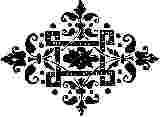
Part III
"Cast Their Crowns Before the
Throne"
"The four and twenty elders
fall down before him
that sat on the throne, and worship him that liveth for ever and ever; and
cast
their crowns before the throne, saying,
"Thou art worthy, O Lord, to receive glory and honor and power: for thou hast
created all things, and for thy pleasure they are and were created."
Revelation
4:10, 11
|
Why do these twenty-four elders cast their crowns before the throne of God?
|

|
Each course of these priestly elders cast their crowns before the
throne of God. This is an act of deference, showing that their power and authority
comes from the one seated on the throne. It is fitting that they should do this. None of
those who will be of this body will ever forget their own unworthiness. They will always
ascribe glory to the one seated on the throne.
Here is where eyebrows may be raised. Alert readers will notice
that the true church does not, in fact, exist at the time of this vision. It is only in
the fifth chapter that the worthy Lamb appears and is pronounced worthy to open the seals
of the book in the right hand of the One seated upon the throne.
How could the church be represented here even before the
Lamb appears?
The answer is relatively simple. The twenty-four courses of
"elders" are the "elders" foreknown and predestined of God. Just as
the "seven Spirits of God" are burning before the throne before the true church
has been developed, yet they are the "seven Spirits"—promises to the overcomers
of the Gospel age. We must view this vision from the standpoint of God’s eternal
purpose.
On the one hand the "elders" are foreordained, their
qualifications and spiritual requirements all pre-determined. Throughout the Gospel age
the "elders" elected to the high calling will gradually (as they prove
overcomers) attain to the purpose for which they are called. That which was foreordained
and those who are finally ordained will one day become one.
In nearly every instance where the twenty-four "elders"
are mentioned, they are found singing and praising God. That is exactly the calling of the
church. We read in Ephesians 1:4-6, 12:
|
"According as he hath chosen us in him before the foundation of the world, that we
should be holy and without blame before him in love:
"Having predestinated us unto the adoption of children by Jesus
Christ to himself, according to the good pleasure of his will,
"To the praise of the glory of his grace, ...
"That we should be to the praise of his glory."
|
That is our calling, brethren, to be for "the
praise of his glory." Every mention of these "elders" finds them praising
and glorifying God.

"Who Is Worthy?"
"Who is worthy to open the book, and to loose the seals
thereof?" Revelation 5:2
The scene progresses into a series of events, centering on the One found
worthy to "open the book"
"sealed with seven seals." We are taken back in time
before our Lord was found worthy. In other words, Revelation is something like a play. It
can go backward and forward in time to depict certain scenes.
Revelation was written in around CE nineties, so we know Jesus had
already come and died and was resurrected. This vision takes us back before that time.
As John beholds this drama unfolding, he begins to weep and sob,
"because no man was found worthy to open and to read the book, neither to look
thereon" (Revelation 5:4).
This drama was so real and intense that John found himself drawn into
it emotionally. He feared the information contained in that wonderful scroll would never
be made known. Notice that there is a time warp here. John was carried in vision before
Jesus was found worthy in CE 33. He was actually living in the late nineties.

"One of the Elders Saith unto
Me,
Weep Not"
"And one of the elders saith unto me, Weep not: behold, the Lion of the tribe
of Juda, the Root of David, hath prevailed to open the book, and to loose the seven
seals thereof." Revelation 5:5
John was not alone in seeing this vision. There was a chief
spokesman for one of the twenty-four "elders" seeing the same vision and
apparently knowing how matters would evolve.
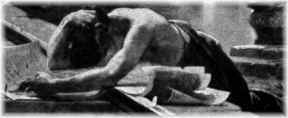
John Weeping
Understanding this is
easier if we think of it as viewing a play which can have scenes past, present and future.
He consoled John out of kindness, but possibly also to allow the vision
to continue to unfold without John’s sobs to interrupt it. |
Who was this kindly elder speaking here for
one of the courses of the priesthood?
We would suggest that this was the Apostle Paul who had visions and
revelations more abundant than all the other apostles. He saw many things not lawful for
him to utter. (2 Corinthians 12:1,4)
Some feel Genesis 49:10 is the "elder" prophecy here. It
says,
"The sceptre shall not depart from Judah, nor a lawgiver from between his
feet, until Shiloh come; and unto him shall the gathering of the people be."
Genesis 49:9 says,
"Judah is a lion’s whelp: from the prey, my son, thou art gone up: he
stooped down, he couched as a lion, and as an old lion; who shall rouse him up?"
But none of this tells us anything about Jesus being worthy.
In order to be worthy, one would have to fulfil the law—that would
mean more than merely keeping the law. Fulfilling the law would require that he fulfill
all the types stated in the Scriptures. He must first suffer and die, and then enter into
glory. We cannot see how Genesis 49:9, 10 would explains our Lord’s worthiness.
Actually three tribes were represented by a lion.
| 1. Judah |
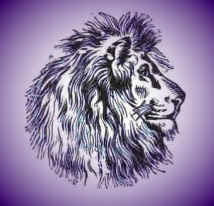 |
"Judah is a lion's
whelp."
Genesis 49:9 |
| 2. Gad |
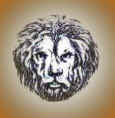 |
"He [Gad] dwelleth as
a lion."
Deuteronomy 33:20 |
| 3. Dan |
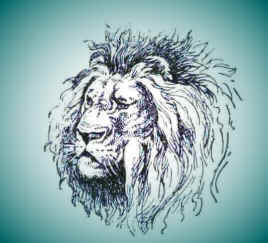 |
"Dan is a lion's
whelp."
Deuteronomy 33:22 |
Dan and Judah are almost identified alike as lions. Which lion was
worthy? We can think of no Old Testament prophecy that suffices here. Having a
"sceptre" did not mean one could keep the Law. We know even the beloved David
broke the law.
This spokes-elder says,
"Weep not: behold, the Lion of the tribe of Juda, the Root of David, hath
prevailed to open the book, and to loose the seven seals" (Revelation 5:5).
"If therefore perfection were by the Levitical priesthood (for under it
the people received the law), what further need was there that another priest should rise
after the order of Melchisedec,
"... For it is evident that our Lord sprang out of Juda; of which tribe
Moses spake nothing concerning priesthood. ...
"For he testifieth, Thou art a priest for ever after the order of
Melchisedec." Hebrews 7:11, 14, 17
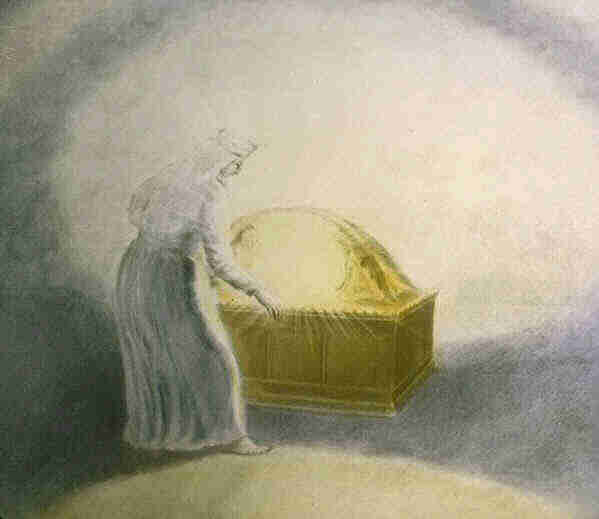
The Levitical Priesthood |
Obviously, the Levitical priesthood could not provide anyone worthy.
Hence the need of a higher priest after the order of Melchisedec, one
who could keep the law and fulfill its requirements.
|
Also 2 Timothy 2:8 reads:
"Remember that Jesus Christ of the seed of David was raised from the dead
according to my gospel."
If Jesus rose from under the second veil, that is all the proof we
need that he was worthy.
We submit, Paul is the kindly elder of Revelation 5:5, the
spokesperson for the graduated priesthood who no longer offer sacrifices for sin. Remember
what Paul said, "Moses spake nothing concerning [the] priesthood" coming from
Judah. (Hebrews 7:14)

Twenty-four "Elders"
with "Harps"
and "Golden Vials [Bowls]"
"Four and twenty elders fell down before the Lamb,
having every one of them harps, and golden vials [bowls] full
of the prayers of saints." Revelation 5:8
Now, we are receiving some vital evidence to help solve this case. The
scriptures of the Old Testament may well be considered harps of God, but it is unlikely
they would be considered as having harps. Also, some prayers of prophetic nature
are recorded of our Lord Jesus, i.e., Psalms 22, etc. It would be hard for the Old
Testament to contain the prayers of the saints, except in a very staid and perfunctory
manner.
The saints may repeat certain expressions such as the prayer of David,
"Cleanse thou me from secret faults," and similar statements, but that would not
be a full embodiment of their prayers. Why wouldn’t the recorded prayers of the New
Testament be added as well?
Do we have definite word from Bro. Russell on what these
harps represent?
Yes! THE NEW CREATION,
p. 233, he says: "The Scriptures
of the Old and New Testaments constitute what the Lord himself designates ‘the harp
of God’ (Revelation 15:2) and the various testimonies of the Law and the prophets are
the several chords of that harp."
|
The Old and New Testaments constitute the "harp of God."
The twenty-four "elders" have "harps," and they
know how to make sweet music with them.
Bro. Russell further says, "that harp, which when tuned by the
holy Spirit dwelling in our hearts, and swept by the fingers of the devoted servants and
searchers after divine truth, yields the most enchanting strains that ever fell on mortal
ears."
|
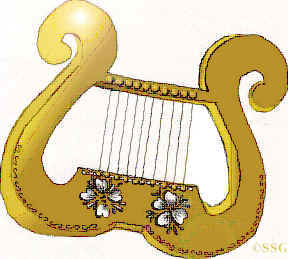
|
So we see Bro. Russell felt "devoted servants and searchers after
divine truth" play enchanting strains of beautiful music. That is what a harp does
when properly used. The "elders" of Revelation and the saints do the same
thing—play harps and make beautiful heavenly music.

How Can the "144,000"
Sing Before the "Elders"?
"And I looked, and, lo, a Lamb stood on the mount Sion, and with him an hundred
forty and four thousand, having his Father’s name written in their foreheads.
"And I heard a voice from heaven, as the voice of many waters, and as the voice
of a great thunder: and I heard the voice of harpers harping with their harps:
"And they sung as it were a new song before the throne, and before the four
beasts [living creatures], and the elders:
and no man could learn that song but the hundred and forty and four thousand, which were
redeemed from the earth.
"These are they which were not defiled with women; for they are virgins. These
are they which follow the Lamb whithersoever he goeth. These were redeemed from among men,
being the firstfruits unto God and to the Lamb.
"And in their mouth was found no guile: for they are without fault before the
throne of God." Revelation 14:1-5
This represents the saints who have been resurrected during our
Lord’s parousia, and might also include those who are "sealed" with
the "Father’s name written in their foreheads."
The problem seems to be that the saints are singing before the throne, and
the four "living creatures," and the "twenty-four
elders." How can that be? This has turned many away from the concept that the
"24 elders" in some way represent the true church.
Revelation is a book of symbols. Just as the "four living
creatures" may sing before the throne and the One seated upon it, so the saints may
sing in the presence of their offices, which they may be assigned to, but will not occupy
until they are joined with Christ in glory of office.
The President of the United States is elected in the fall, but does not
take office until January. He is the President elect. Of course, our presidents usually
sing one tune before they take office and another one after they take office. Not so with
the saints.

The Twenty-four "Elders"
and the "144,000"
Sing the Same New Song
|
"And they sung
a new song, saying, Thou art worthy to take the book, and to open the seals
thereof: for thou wast slain, and hast redeemed us [men-A] to God by thy
blood out of every kindred, and tongue, and people, and nation;
"And hast made us [them-SA] unto our God kings and
priests: and we [they-SA] shall reign on the earth."
Revelation 5:9, 10 |
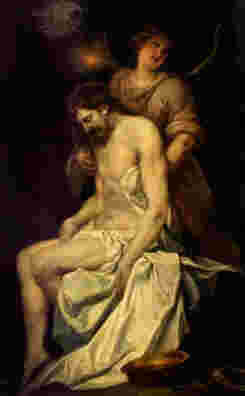 |
The "saints" and the "twenty-four
elders" have a very special relationship. We notice that both the "elders"
and the "saints" like to sing. There is no problem with the twenty-four
"elders" who were foreordained of God, singing outside of their offices.
The key to this verse is the fact that the twenty-four
"elders" sing the "new song." What does that tell you? A lot. In
Revelation 14:1-3 we learn the "144,000" sing this same new song and "no
man could learn that song but the hundred and forty and four thousand, which were redeemed
from the earth."
Now, supposing you had no preconceived idea as to whom these
twenty-four "elders" might be and that all you knew was that they sing the
"new song" that only the "144,000 saints" can sing. The equation would
be:
X : New Song = New Song :
144,000 Saints
Twenty-four Elders : New Song = New Song :
144,000 Saints |
Yes, the "144,000 saints" and the
twenty-four "elders" are related very closely. They both sing the same
song which is known only to the "144,000 saints." This, added to the
fact that they both have "harps" to help their singing makes a strong case. Both
groups sing the same song that only the "saints" can sing. Geometry taught us
that "things equal to the same thing are equal to each other."

"Golden Vials [Bowls]"
"And when he had taken the book, the four beasts and
four
and twenty elders fell down before the Lamb, having every one of them harps, and
golden vials [bowls] full of odors, which are the prayers of saints."
Revelation 5:8
Twice in Revelation "golden vials [bowls]" are
mentioned. It is interesting to note these "golden bowls" are full of
"odors" or the fragrance of the prayers of saints. Normally, we don’t think
of prayers as being a bowl of conveyance of our prayers. Yet the bowl is a low flat vessel
which may be used to pour out what it is we hope to convey. Our prayers are not narrow
messages, which God receives, but we can pour out our hearts before the Lord in
substantial fashion.
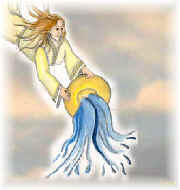
The Golden Vials [Bowls] |
The bowls seem to
represent the extravagant means we have in prayer to convey all that is in our hearts, our
praise, thanksgiving, adoration, heartfelt appreciation, the warmth, the love, the
tenderness, the concerns, the burdens we share for others and for ourselves.
The list could go on and on. It takes bowls to contain all these and
they in turn are poured out to our Heavenly Father. It is a beautiful symbol.
|
God also has some bowls he pledges he will pour out.
As a matter of fact, he has "seven bowls" which will "fill up the wrath of
God." We read in Revelation 15:7:
"And one of the four beasts
[living creatures, Justice]
gave unto the seven angels seven golden vials [bowls] full of the wrath
of God, who liveth for ever and ever."
This is a reference to Revelation 14: 9, 10:
"If any man worship the beast and his image, and receive his mark in his
forehead, or in his hand,
"The same shall drink of the wine of the wrath of God, which is poured out
without mixture into the cup of his indignation."
That is God’s answer to Revelation 13:14-17 where the
"image of the beast" speaks and threatens all who do not "worship the
beast" or its "image." They say you must receive our "mark" in
your "forehead" or in your "right hand." You don’t necessarily
have to believe as we do, but co-operate with us if you want religious liberty.
God says you must not. If anyone does, they shall drink the undiluted
wrath of God, full strength, the "poison hemlock."
In Revelation 15:2 we learn of those who refused to bow to the edict
of the "image" and the "beast." These "had gotten the victory
over the beast and over his image." These are then divinely provided with "seven
golden vials [bowls]" which will fill up the "wrath of God." The seven
"last plagues" cannot be delivered in their intended strength until these
"vials [bowls]" are provided.
Do not ask what these bowls are. God has to provide them, and he will.
Without them, the seven "last plagues" may only be delivered in diluted form and
only in token potency.
By the way, the saints getting the victory over the
"beast" and its "image" is not some small feat. Jesus calls
extravagant attention to this class in Revelation 20:4. He says of these, they "had
not worshipped the beast, neither his image, neither had received his mark upon their
foreheads, or in their hands."
In other words, no one who gets the "mark of the beast" and
its "image" may hope to be of the bride of Christ. That would be out of the
question. This should be a warning to all the Lord’s people.

"What Are These in White
Robes?"
"And one of the elders answered, saying unto me, What
are these which are arrayed in white robes? and whence came they? And I said unto him,
Sir, thou knowest.
"And he said to me, These are they which came out of great tribulation, and have
washed their robes, and made them white in the blood of the Lamb." Revelation 7:13,
14
Here the chief elder, probably Paul, speaks for one of the
courses of "elders." He asks John if he knew who this class was who needed to
"wash their robes in the blood of the Lamb." John, says, "Sir, thou
knowest." It would be strange to address a book of the Bible as "Sir."
In Revelation 7:11 we find the "elders"
"...fell before the throne on their faces, and worshipped God,
"Saying, Amen: Blessing, and glory, and wisdom, and thanksgiving, and
honor, and power, and might, be unto our God for ever and ever. Amen."
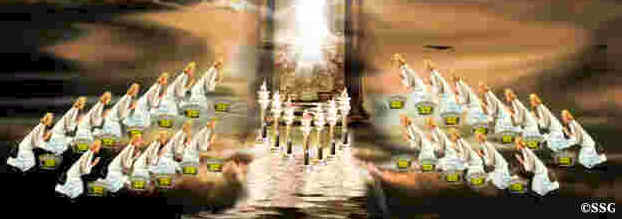 |
In every
mention of these twenty-four
"elders" they are found praising God.
Remember the calling of the church:
We are called for
"the praise of His glory." |
Who are this "great multitude" which stood "before the
throne, and before the Lamb, clothed with white robes, and palms in their hands"?
Revelation 7:9
Most brethren know the answer. Where did we get the answer? From Bro.
Russell. Where did he get the answer? From Paul, the spokesperson for this course of the
"elders."
It is Paul who shows us the inside story of the Great Company. The
first person we know he consigned to the Great Company is recorded in 1 Corinthians 5:4, 5
(RSV)
where he says,
"When you are assembled, and my spirit is present, with the power of our
Lord Jesus, you are
"To deliver this man to Satan for the destruction of the flesh, that his
spirit may be saved in the day of the Lord Jesus."
Here, Paul demanded that the church at Corinth commit this
brother to Satan. They were not asked to decide his case. They were told what they must
do.
Two other brethren we know by name were also remanded to Satan.
"Hymenaeus and Alexander; whom I have delivered to Satan, that they may
learn not to blaspheme." 1 Timothy 1:20
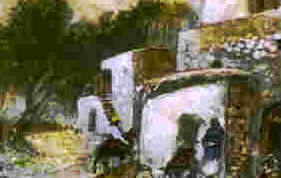
House to be built
on Christ our Rock
|
In 1 Corinthians 3:12-15 we learn of two classes.
One builds with "gold, silver and precious stones," whereas
the other with "wood, hay and stubble."
Both classes build upon that rock which is Christ.
However, one class will suffer loss, but their faith structure will be
saved but so as by fire, and their spirits will be saved.
|
None of us could know these things without the writings of the Apostle
Paul.
The Old Testament does have illustrations of the Great Company, such
as the scapegoat for Azazel, and many other scriptures that we can look back on as
illustrating the Great Company. However, we could not understand these types without the
writings of Paul. Types do not teach doctrines—they only illustrate them.
It is Paul, beyond doubt, who gives us the true understanding of the
Great Company. He also places three people there, two by name. This is not theoretical.
Remember that John addresses this "elder" as "my
Lord" or "Sir." It is a personal title of respect. Could he call a prophecy
"My Lord" or "Sir"? It would be most unusual if he did. It fits
properly when we apply it to Paul, as representative of one of the twenty-four courses of
"elders."

"We Give Thee Thanks"
"And the seventh angel sounded; and there were great voices in heaven, saying, The
kingdoms of this world are become the kingdoms of our Lord
[probably, Jehovah], and
of his Christ [head and body members]; and he shall reign for ever and ever.
"And the four and twenty elders, which sat before God
on their seats, fell upon their faces, and worshipped God,
"Saying, We give thee thanks, O Lord God Almighty, which art, and wast, and art to
come; because thou hast taken to thee thy great power, and hast reigned." Revelation
11:15-17
We notice in this instance the four "beasts" [living
creatures] are not mentioned. Here the whole body of "elders" seems to be
singing and praising God because a critical moment in the plan of God has begun.
This holy body seems bent on singing and praising God in every instance
recorded in Revelation. This ties in with the calling of the church who are called
for "the praise of His glory." We notice a progression in the status of events. In
this event, "the four and twenty elders, which sat before God on their seats
[thrones], fell upon their faces, and worshipped God."
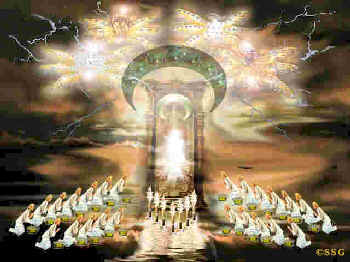
In Revelation 4:10 it reads a little
differently.
"The four and twenty elders fall
down before him that sat on the throne, and worship him that liveth for ever and
ever."
The difference is that in Revelation
11:16 it specifically says, "fell upon their faces." This could not take place
even in token form until the resurrection of the sleeping saints. |
This foreordained body of "elders" has
"faces" associated with it and the personalities of the vast majority of the
saints. We are not meaning to imply that the twenty-four courses of "elders" are
complete and operational. This will not be so until the complete number have the
"Father’s name written in their foreheads" (Revelation 14:1).
When the "marriage" of the Bride and the Lamb is consummated
then those who were foreordained will fuse into oneness with those who are "called,
chosen and faithful."

Last Mention of the
"Four and Twenty Elders"
"And after these things I heard a great voice of much people in heaven, saying
Alleluia; Salvation, and glory, and honor, and power, unto the Lord our God:
"For true and righteous are his judgments: for he hath judged the great whore,
which did corrupt the earth with her fornication, and hath avenged the blood of his
servants at her hand.
"And again they said, Alleluia. And her smoke
[memory of her evil reign]
rose
up for ever and ever.
"And the four and twenty elders and the four
beasts fell down and worshipped God that sat on the throne, saying, Amen; Alleluia."
Revelation
19:1-4
We find considerable exuberance when Babylon, that great and
abominable "woman" that reigns over the kingdoms of this world, is judged and
about to be destroyed.
This is a proclamation which has not yet been heard because Babylon,
that "great city, which reigneth over the kings of the earth," has not been
visited with the judgment and destruction. It still awaits her (Revelation 17:18).
In this judgment the four "living creatures" as well as the
"four and twenty elders" together fall down in praise and worship of the One
sitting on the throne. All have waited a long time to see this moment when righteousness
and justice will at last be served. No, God is not slack concerning His promises.
God has a due time for everything. We simply must await this due time.
It will surely come and it will not tarry. No one will be able to say, this evil system
escaped a just punishment for her sins.
In Revelation 6:9, 10 we hear a cry for justice:
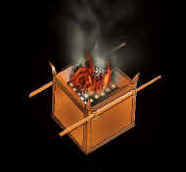
|
"I saw
under the altar the souls of them that were slain for the word of God, and for the
testimony which they held:
"And they
cried with a loud voice, saying, How long, O Lord, holy and true, dost thou not judge and
avenge our blood on them that dwell on the earth." |
There are two scriptures referring to that moment
when justice is at last served. When in Revelation 16:4-7, the third angel pours out his
"vial" [bowl] on "rivers and fountains of waters" [the theological
schools and seminaries and all fountain sources of false teaching], we hear a cry go up at
this moment.
"And I heard the angel of the waters say, Thou art righteous, O Lord,
which art, and wast, and shalt be, because thou hast judged thus.
"For they have shed the blood of saints and prophets, and thou hast given
them blood to drink; for they are worthy."
It is important that God be vindicated and it is known that these
events are not just some happen stance of history. No, it is God’s appointed moment
of vengeance. All "righteous blood" unjustly shed must be accounted for in
God’s books. "Vengeance is mine; I will repay, saith the Lord" (Romans
12:19).
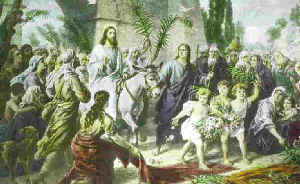
Triumphal Entry of Christ |
Revelation 19:1, 2 presents the second Biblical vindication of God’s justice.
Jesus appeared on
a donkey at his first advent.
His Second Advent is quite different.
In Revelation 19:11, 14 we get the rest of the story.
|
The returned Lord is seen with "armies"
(plural) in the heavens of earth who are on "white horses, clothed in fine linen,
white and clean." He appears in righteousness to judge and make war. He cannot fail
or be defeated because he comes with the invincible title, "Word of God."
We know God’s Word cannot be broken, hence, only victory can
attend our Lord and his "armies in white." How very appropriate that both the
"four beasts" [living creatures] and the "four and twenty elders"
sing, "Praise our God, all ye his servants, and ye that fear him, both small and
great" (Revelation 19:4, 5).
We live in a no fault society, and hence justice is not very
important. Somehow, the long history of evil associated with the false religious systems
tends to fade into obscurity.
Not so in God’s books. All "righteous blood" spilled
must be accounted for. That includes the murder and persecution of all the saints
throughout history. The last place anyone would want to be is in those systems that
perpetrated all the evils of the inquisition, with the vast numbers of innocent people
tortured and killed, and where the false church confiscated their properties. They not
only killed, but they stole the possessions of their victims leaving mothers and children
homeless.
The inquisition became the tool for the church amassing great wealth as
it stole all its victims’ properties. At one point the church owned one-third of the
lands of Europe—much of it ill gotten, staining the hands of the possessors with the
blood of saints.
This is the last mention of the four and twenty "elders."
From first to last they are praising God. We believe that after this last battle of
Revelation 19 ensues, when the "leopard beast" and the "false prophet"
are cast "alive" into the lake of fire, then will come the moment when the elect
and glorified church will enter into the marriage.
That will be a great moment in history, when the plan of God will have
reached a glorious fulfillment. From thenceforth they shall have reached the fruition of
their calling to be for "the praise of His glory," now and forever. Amen.
Click to go to the following:
Topical
Study on:
"Casting Down Golden Crowns" Part I - Part II - Part III - Part IV
Chapter/Verse by Verse Study on:
Revelation 4
Topical Study Home Page - Chapter Study Home Page
- Sinaitic Manuscript - Questions - Glossary.
E-Mail
Day7000@sbcglobal.net with comments.
Copyright 2001 John Class
|